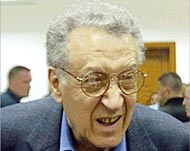UN draft sets no date for Iraq troop exit
A new US-British drafted UN Security Council resolution endorsing sovereignty for an Iraqi caretaker government approves the presence of the US-led occupation force there but sets no date for the troops to leave.

The resolution, distributed to council members on Monday, would back the formation of a “sovereign interim government” that would take office by 30 June and says that government would “assume the responsibility and authority for governing a sovereign Iraq.”
The draft emerged as President George Bush prepared a televised speech later on Monday, mapping out his plans for Iraq where attacks on occupation forces have thrown into doubt prospects for a peaceful transfer to democratic rule.
As part of the transition process, UN envoy al-Akhdar al-Ibrahimi, now in Baghdad, is due to name a president, a prime minister, two vice presidents and 26 ministers before the end of May. They would stay in office until elections for a national assembly, expected to be held by January 2005.
Sovereignty
The definition of sovereignty is a contentious issue, with the Bush administration attempting to assure UN Security Council members they would not be asked to approve an occupation under another name.
 |
|
Al-Akhdar al-Ibrahimi due to name |
British ambassador Emyr Jones Parry told reporters the resolution “underlines clearly that all sovereignty will be returned to the Iraqis, that the interim Iraqi government will assume total responsibility for its own sovereignty.”
But the text is bound to run into criticism from France, Germany, Russia and others who opposed the Iraqi invasion last year. It does not give a definite timetable for the US-led force to leave and instead calls for a review after a year, which a new Iraqi government can request earlier.
A review, however, would be similar to an open-ended mandate and would not mean the force would leave unless the Security Council, where the United States has veto power, decides it should do so.
No date for vote
No date was set for a vote on the resolution, which will be the subject of intense discussion in the coming days.
|
“The resolution underlines clearly that all sovereignty will be returned to the Iraqis, that the interim Iraqi government will assume total responsibility for its own sovereignty” |
The resolution, contrary to expectations, is silent on an “opt out” clause that would allow Iraqi troops to refuse a command from the American military. Instead it calls for arrangements “to ensure coordination between the two.”
Diplomats said once a new Iraqi government is in place, its leaders would exchange letters with the US military command and the Security Council on military arrangements.
The resolution is also silent on prisoners and jails run by the United States and other forces, on the fate of those now incarcerated and those imprisoned in the future.
Oil revenues
On oil, the draft resolution says Iraq would have control over its oil revenues. But it would keep in place an international advisory board, which audits accounts to assure investors and donors their money was being spent free of corruption, UN envoys said.
Under a May 2003 Security Council resolution adopted after the fall of Saddam Hussein, all proceeds of Iraq’s oil and gas sales were deposited into a special account called the Development Fund for Iraq, controlled by the US-led Coalition Provisional Authority.
The new measure calls on all UN member-states to take steps to ensure no law suits are filed against Iraq or any of its state-owned enterprises for a period of 12 months.
Curtailing an existing UN arms embargo, the draft would allow the importation of arms by either the multinational force or the Iraqi government.